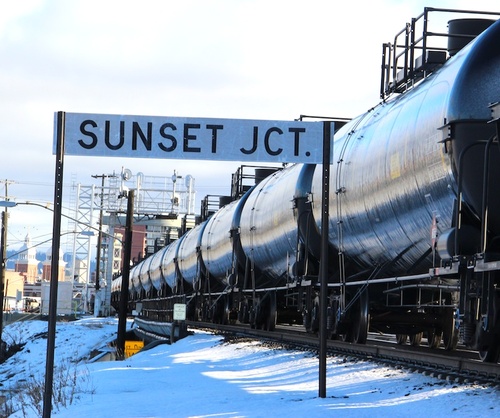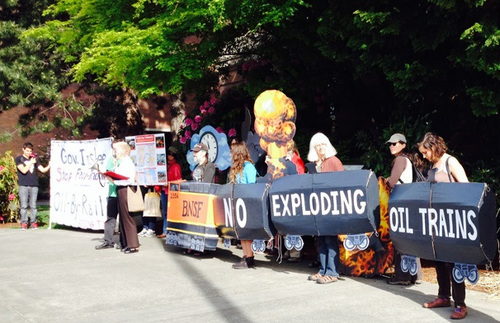This post was co-written with Matt Krogh, Tar Sands SOS Campaign Director for ForestEthics
When it comes to crude by rail, "If we don't have the body count to justify the cost of the rule vs the benefit, DOT hasn't been getting rules through." That's according to National Transportation Safety Board safety expert Deborah Hersman. Unlike a congested Federal bureaucracy, Spokane doesn't have to wait for that body count to take action.
You'd be hard-pressed to find another scenario so ripe with risk, uncertainty and horrific examples of failure, while simultaneously unimpeded by regulators or even common sense safety measures. New proposed crude by rail terminals in Washington, Oregon and California -- each capable of receiving five to 35 giant unit trains a week -- mean that Spokane's rail funnel, and communities like Spokane Valley, Spokane and Cheney, are facing a concentration of risk never before witnessed.
Washington and Oregon's terminals alone would add up to nearly 14 fully loaded bomb trains each day, traveling south in to Spokane Valley from Sandpoint, then west along the Spokane River, through the University District, next to two major hospitals, right through downtown Spokane, over I-90 and Hangman Creek, then off through Cheney en route to west coast facilities.
Are we prepared? Just ask Karl Alexy, of the Federal Railroad Administration, who said "Hazmat regulations never contemplated unit trains (of crude and ethanol)." Or Chief Edinger of the International Association of Fire Chiefs (IAFC), who said "Oil by rail transport exceeds emergency response capacity."
And accidents are guaranteed. Even as you read this, the ink is still drying on a news story out of Colorado where six oil tank cars derailed in the town of Milliken, spilling crude oil into a ditch; by all accounts, a near miss for a far worse situation.
The Milliken "accident" pales in comparison to the other similar stories out of towns across North America over the last year, in what can only now be presumed is a very nervous waiting game for communities that sit along the rail lines.
To recap a few of those crude by rail accidents:
- Lac-Megantic, Quebec, July 2013: 47 people were killed and a downtown destroyed by fire after a crude oil train derailed and exploded.
- Aliceville, Alabama, November 2013: More than 750,000 gallons of Bakken crude oil spilled into fragile wetlands.
- Casselton, North Dakota, December 2013: People within five miles evacuated due to caustic smoke from a Bakken crude oil train crash.
- Plaster Rock, New Brunswick, January 2014: An explosive fire resulted from a Bakken crude oil train derailment.
- Lynchburg, Virginia, April 30, 2014: Downtown Lynchburg evacuated. The James River contaminated with at least 50,000 gallons of Bakken crude oil forcing cities downstream to switch to alternate water supplies.
When the IAFC head was asked about emergency response to unit crude train derailment, he said they didn't have a specific code -- they just use NFPA 472. That's the standard for responding to weapons of mass destruction.
Meanwhile, elected officials from municipal to federal, regulatory officials, emergency response officials, news agencies, special interest organizations and citizens have repeatedly questioned (to little avail) the safety of this process and the safety of the tank cars, the response plans currently in place or the lack thereof, the preparedness for a disaster and disclosure of what is coming through our communities and when. Yet down the tracks these ticking bomb trains go.
The big question still remains; what needs to happen or how bad does an accident have to be until we can say, "NO, not through our town?"
Back in December, Spokane hosted a public hearing at which agencies heard citizen concerns and suggestions on the scope of an environmental impact assessment for one of the aforementioned proposed projects, a facility planned for Vancouver.
Now two more proposals are making their way through the regulatory process, slated for Grays Harbor, yet this time no hearing or meeting is planned to take citizen questions or comments here in the Spokane region.
Citizens of the Inland Northwest deserve to have their voices heard. To that end, there will be a People's Hearing at the Rotary Fountain in Riverfront Park in Spokane on Wednesday, May 21st at 5:30 p.m., where community members and community leaders will be making a few public comments for the press as well as having an opportunity to sign official comments for the record for the Grays Harbor proposals.
We as the Inland Northwest community will continue to press for answers, to show concern, and demonstrate our unwavering determination to stop Spokane, Spokane Valley or Cheney from being entries on a list of rail disasters. Just as the oil companies and BNSF have been steadfast in their push to turn our nation's rail lines in to conveyances for dirty energy, corruption, greed and disasters, we will be steadfast in our push to create a safe, prosperous and clean Spokane.

